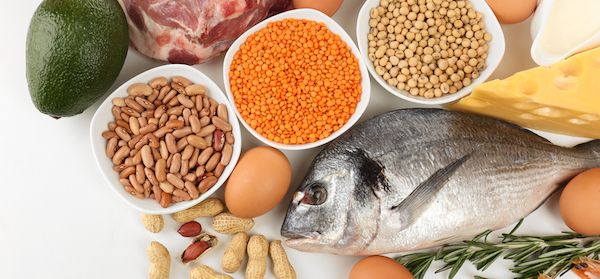Protein, an essential nutrient, is vital to every cell in the body. It is responsible for maintaining hair and nail growth, repairing skin, regenerating blood and rebuilding muscles. Protein is particularly important for reducing muscle loss during ageing.
Unlike other essential nutrients, such as fat and calcium, the body does not store protein, so you need to continually replenish it by eating good-quality sources of protein.
Dairy: Low-fat and fat-free dairy foods, such as milk, cheese and yoghurt, provide the body with good-quality protein. Try to opt for Greek-style yoghurt, as it contains about double the amount of protein, provides the body with beneficial bacteria and has fewer additives than flavoured yoghurts.
Meat: Lean white meat in the form of chicken and turkey, along with seafood such as salmon, prawns and tuna, are great sources of protein. Red meats, including lean pork, lamb and beef also provide a good dose of protein.
Eggs: An excellent alternative to meat, eggs contain a good dose of good-quality protein. They are also great for boosting vitamin D, which is necessary for healthy bones and prevention of heart disease and cancer.
Grains, nuts and seeds: All grains, seeds and nuts contain protein, but lentils, chickpeas, almonds, almonds, peanuts, sunflower seeds, pumpkin seeds and wholegrains, such as quinoa and buckwheat are especially high in protein.
Soy products: Enjoyed by omnivores and herbivores alike, tofu (hard) and soy milk will provide you with a great protein boost, which will help with energy production in the body.
Whey protein: A quality protein source commonly derived from milk and cheese, whey protein is widely marketed as a dietary supplement. It is the main ingredient in most protein shakes used by athletes looking to build muscle, but on its own can be added straight to smoothies and breakfast cereals. It can be found in most health shops and chemists, and is best used in addition to a balanced protein-rich diet.
Spirulina: this superfood comes in the form of a dark green powder and is known for its iron- and protein-boosting properties – as well as it’s very distinct smell – although large amounts are needed to get a sufficient dose. So it’s best for supplementing your protein intake rather than being your major source. It can be found in most health food shops and chemists.
Prefer to go vegetarian? Learn how to get protein without meat.
Also, here are five ways to boost fibre every day.

